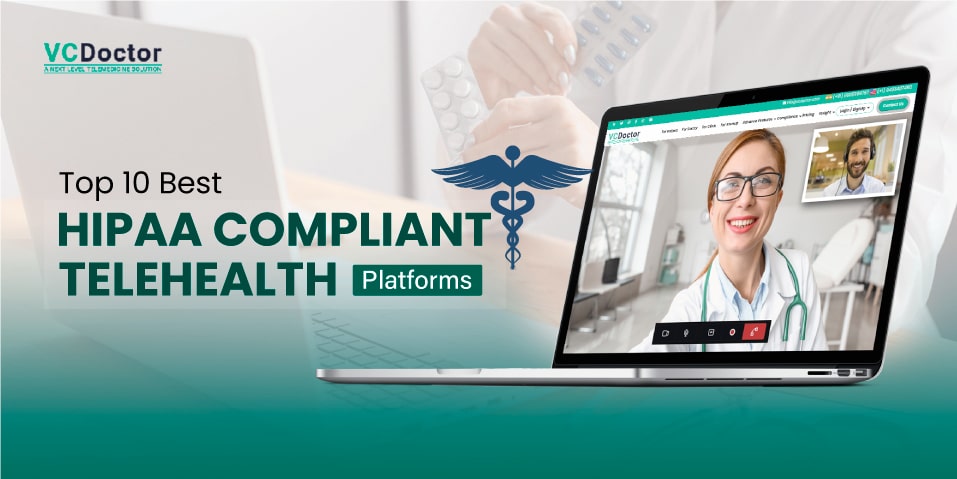Top 10 Best HIPAA-Compliant Telehealth Platforms
We live in a technologically advanced world where technology drives all industries and sectors. Out of all, one industry that experienced a major revolution was the healthcare sector. During COVID, when public gatherings and meetings were restricted, meeting public healthcare needs became a major challenge. That is when the telehealth and telemedicine platforms came into the limelight. Telehealth platforms are highly advanced, which allow healthcare experts to provide consultations remotely to patients. Since telehealth platforms include hefty patient data, security measures must be taken to avoid data breaches. Thus, making your telehealth platforms secure is vital. Presently, there are multiple HIPAA-compliant telehealth platforms available.
You must know about these platforms if you are a healthcare expert in the medical industry. This article is a complete guide on the best HIPAA-compliant telehealth platforms. So, without any delay, here we go!
Table of Contents
- Telehealth: A Quick Introduction
- Top Ten Best HIPAA-Compliant Telehealth Platforms
- Features of HIPAA-Compliant Telehealth Platforms
- A step-by-step guide to building a HIPAA Compliant Telehealth Platform
- Things to Consider when Choosing a Telehealth Platform
- Wrapping Up!
- FAQs
Telehealth: A Quick Introduction
Telehealth uses digital information and communication technologies to deliver healthcare facilities efficiently. Using this technology, healthcare experts can deliver quality healthcare services to patients remotely from the comfort of their homes. It eliminates the need to travel to the clinic to get regular checkups.
This saves time and money, eliminating the need to travel great distances and stand in line for extended periods. These software programs are gaining popularity lately since they promise rapid medical attention in dire circumstances, potentially saving lives. As a result, they attract great attention from patients and health experts.
Top Ten Best HIPAA-Compliant Telehealth Platforms
1. VCDoctor
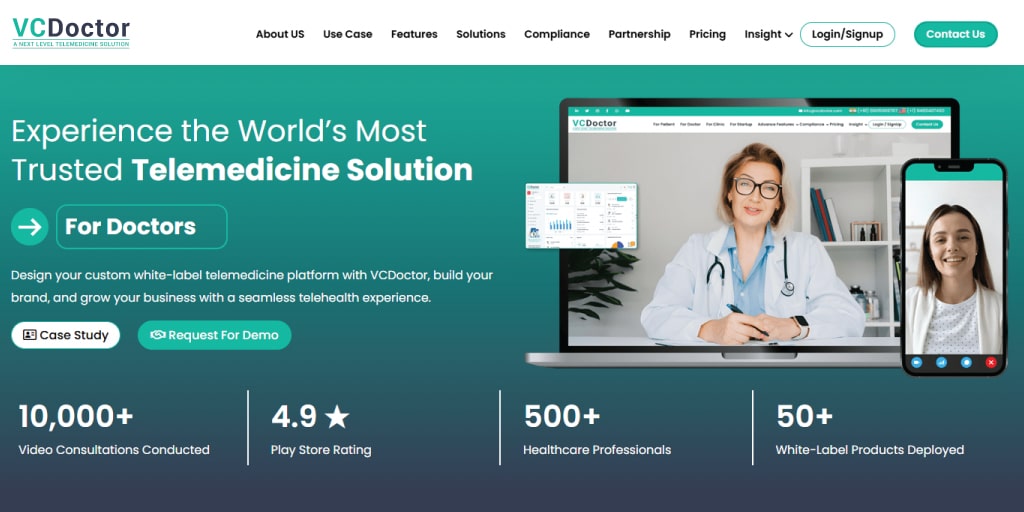
VCDoctor is a US-based telemedicine development company that adheres to HIPAA compliance standards. It allows doctors to diagnose and treat patients without time and location limitations. VCDoctor is a one-stop solution where experts offer patient-centered care and suggest top-tier solutions.
Features:
- End-to-end encryption
- Secure video consultations
- E-prescriptions
- Appointment scheduling
- Patient data management
- Integrated billing
Pros:
- patient data protection with robust encryption
- offers features from scheduling to billing
- Intuitive interface
- Adheres to HIPAA regulations
Cons:
- Limited customization
2. SmartClinix
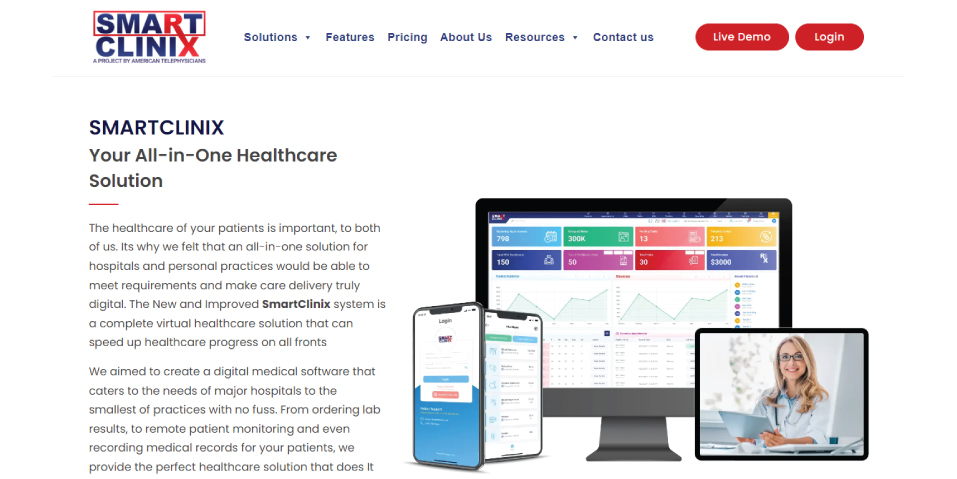
It is a physician-led digital healthcare organization popularly known as the unified HIPAA-compliant telehealth Platform. This cloud-based platform can be accessed from around the world. It offers physicians and patients an excellent care package at customizable pricing for every budget. It is an all-in-one solution that works well on Android and iOS devices.
Features:
- EHR integration
- Secure Messaging
- Patient management tools
- Analytics and Reporting
Pros:
- User-friendly and highly intuitive interface
- Exceptional patient management
- Robust data analytics tools
Cons:
- Costly for smaller practices
- Limited customization options are available
3. Teladoc
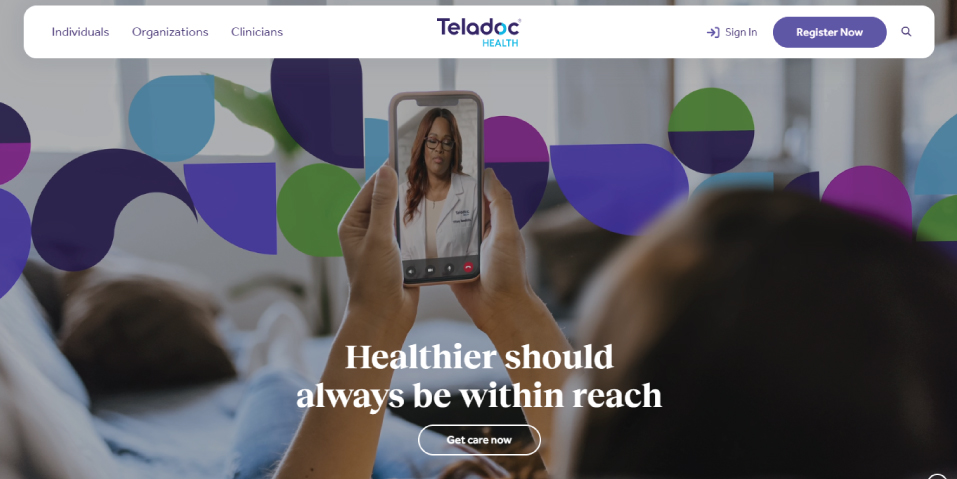
Known as a popular and largest healthcare provider, Teladoc offers various services. These include virtual doctor visits, mental health counseling, maternity support, and chronic medical condition management. Patients on the Teladoc platform can get round-the-clock medical consultations from experts. If you want comprehensive telehealth care, Teladoc is an ideal choice!
Features:
- 24/7 access to healthcare providers
- E-prescriptions
- Mental health services
- Chronic condition management
Pros:
- Wide range of services
- Large network of healthcare providers
- High user satisfaction
Cons:
- Higher costs for premium services
- Some users report variability in provider quality
4. Amwell
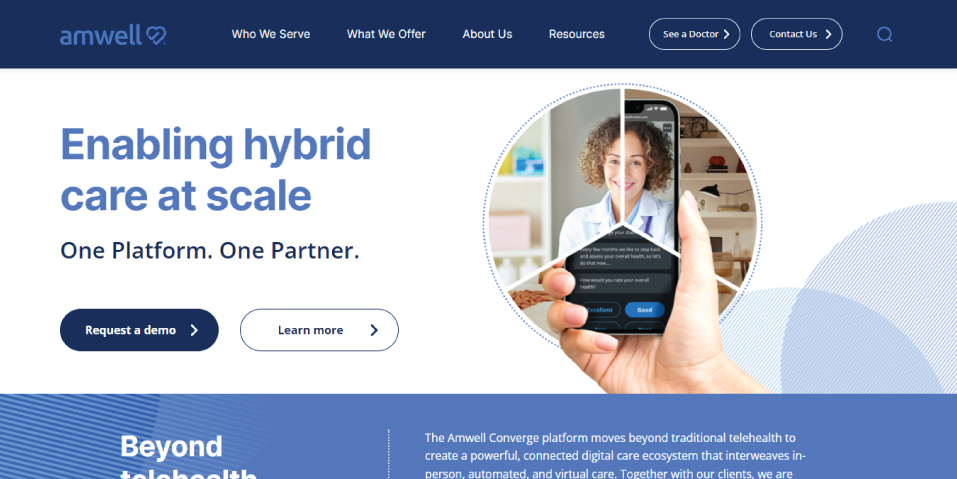
Known for combining the goodness of quality care and convenience, Amwell is a popularly known HIPAA-compliant telemedicine platform that provides patients easy access to doctors and specialists. It is a well-established platform designed for enterprise health services and individual consultations.
Key Features:
- On-demand and scheduled visits
- Integrated with electronic health records (EHR)
- Multi-lingual support
Pros:
- Easy to use
- Flexible scheduling
- High-quality video and audio
Cons:
- It can be costly without insurance
- Limited availability in certain regions
Need Help Choosing the Right Telehealth Platform?
Our experts can guide you to the best HIPAA-compliant solution for your practice.
Talk to Our Experts5. Vsee
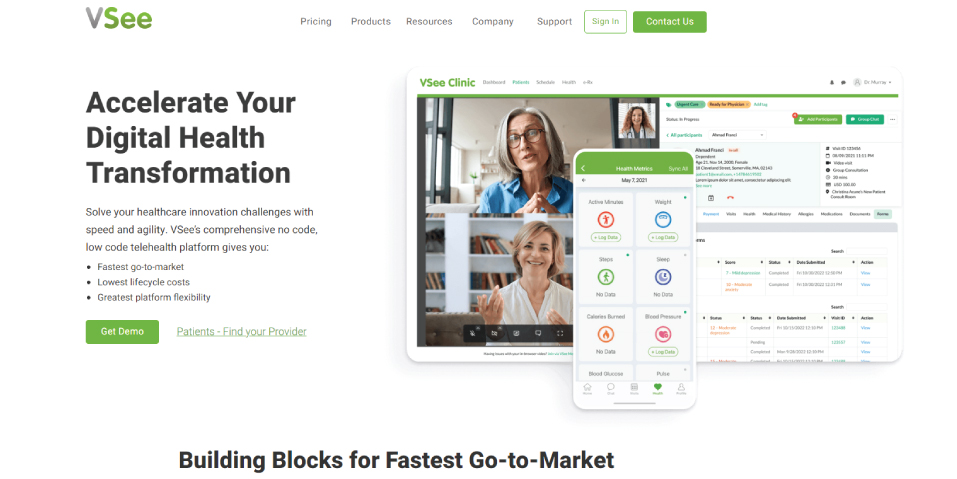
Vsee is a secure telehealth platform that offers screen sharing and EHR integration. Popularly known for easy integration and flexibility, the platform promotes customizable solutions. It comes with additional tools for seamless patient monitoring and clinic management.
Features:
- Secure video calls
- Screen sharing
- EHR integration
- Remote monitoring
Pros:
- Free version available
- Easy to integrate with existing systems
- Customizable solutions
Cons:
- Limited features in the free version
- Occasional connectivity issues
6. MDLive
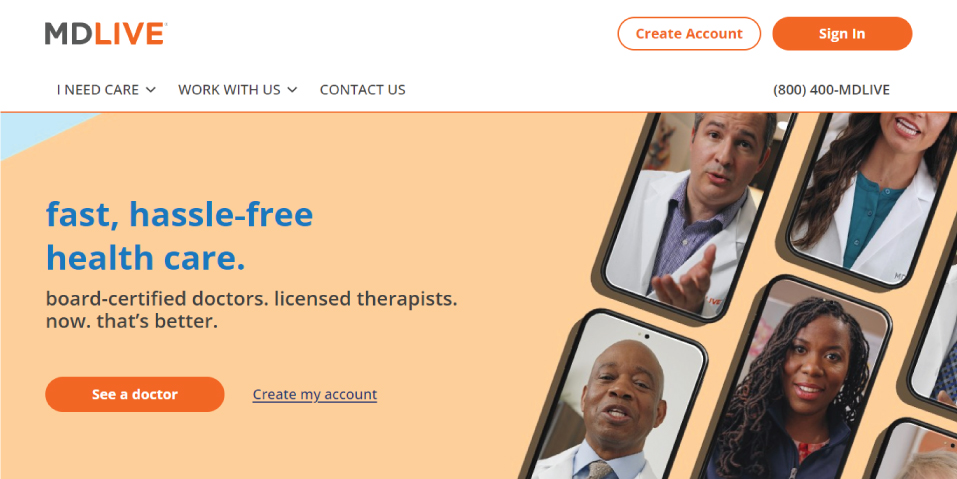
MDLive is a HIPAA-compliant telehealth platform that offers 24/7 access to specialists and doctors. It also promotes e-prescriptions and behavioral health services. MDLive is known for offering various high-quality services and a user-friendly interface. However, it can be costly in some cases.
Features:
- 24/7 access to doctors
- Behavioral health services
- E-prescriptions
- Secure video and audio calls
Pros:
- Wide range of services
- High-quality care
- User-friendly interface
Cons:
- Higher costs for some services
- Limited availability in some areas
7. PlushCare
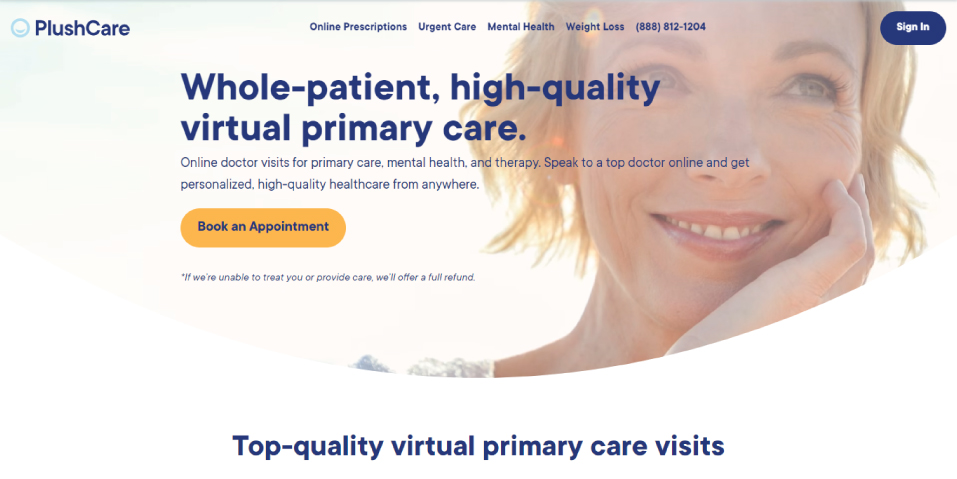
PlushCare emphasizes continuity of care and offers a smooth experience for individuals seeking mental health and primary care services, including the ability to submit prescriptions and lab testing. This telemedicine platform excels in medication and prescription, offering exceptional features and support for electronic prescriptions.
Features:
- Online consultations
- Prescription management
- Lab test ordering
- Primary care services
Pros:
- High-quality care
- Membership model offers cost savings
- Excellent prescription support
Cons:
- Membership fees may not suit infrequent users
- A smaller pool of doctors
8. Doximity
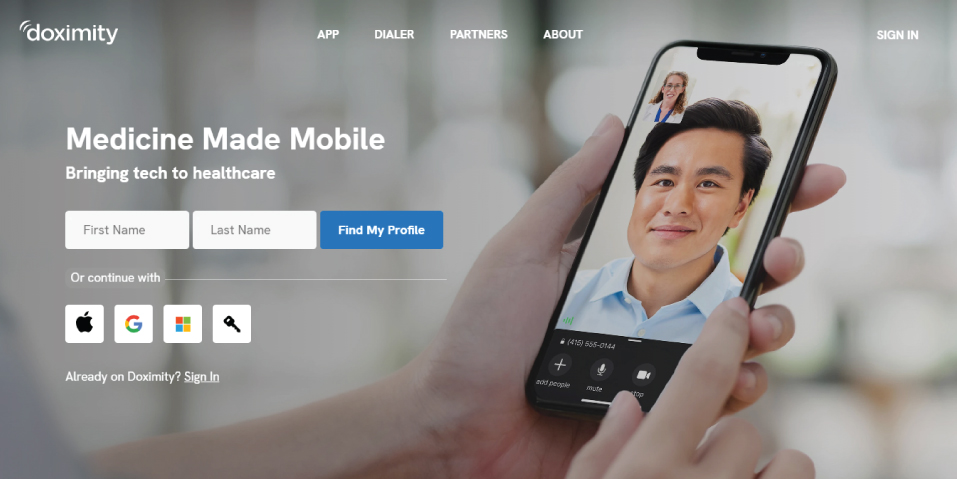
Doximity offers multiple plans that are customized to meet specific needs. These plans include a free version for students and individual practitioners and more extensive paid alternatives for free clinics, small practices, and large healthcare systems.
Features:
- Video conferencing
- Secure Messaging
- EHR integration
- Digital fax services
Pros:
- Free version available
- Robust security features
- Mobile app for access
Cons:
- Limited advanced features in the free version
- Some plans are expensive
💬 Have Questions About Telehealth Compliance?
Chat with us on WhatsApp and get expert advice instantly
Let’s Talk9. Healthie
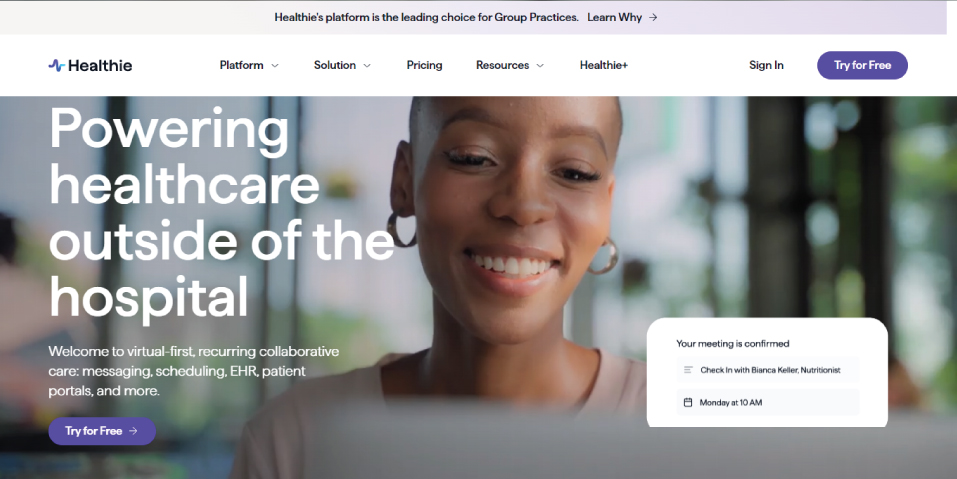
Designed for nutrition and wellness professionals, Healthie is a commonly used platform offering features for program management and client engagement. With workflow automation integrated into a single, compliant platform, it handles insurance, care planning, and billing.
Features:
- Client engagement tools
- Group sessions
- Integrated billing and scheduling
Pros:
- Free starter plan
- Scalable for different practice sizes
- Comprehensive client management tools
Cons:
- The free plan has limited features
- Advanced features require higher-tier plans
10. Spruce Health
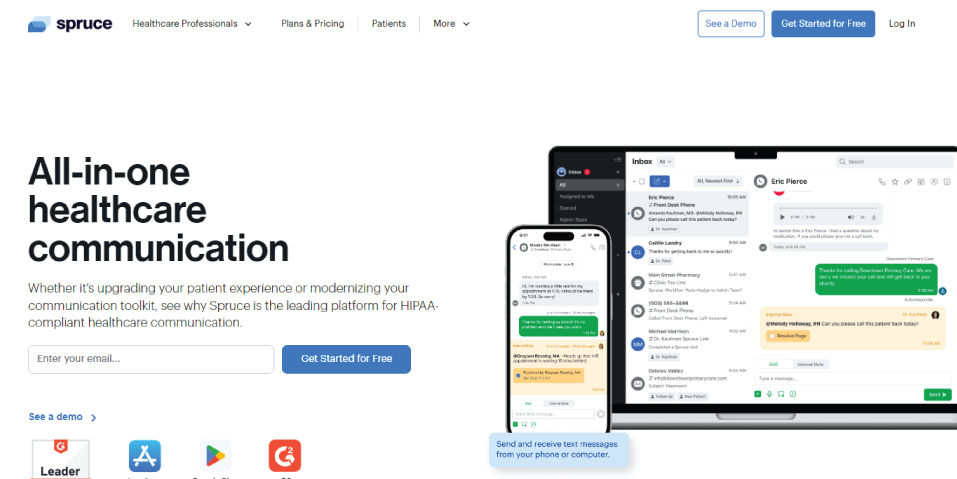
Spruce Health is an all-in-one HIPAA-compliant telemedicine software offering call, text, video services, and voicemail. It is designed for doctor’s offices with high call volumes. Spruce Health works well for larger clinics or solitary practitioners. Medical professionals can decide whether or not to answer calls because it distinguishes between personal and professional calls.
Features:
- Secure Messaging
- Video consultations
- EHR integration
- Patient management
Pros:
- Easy to use
- Strong communication tools
- Integrated patient management
Cons:
- Top-notch features require additional costs
- Limited customization options
Features of HIPAA-Compliant Telehealth Platforms
Here are common features of HIPAA Compliant Telehealth platforms:
1. End-to-end encryption
HIPAA-compliant telehealth platforms use strong encryption methods to safeguard data at rest and in transit. This means all the information shared between healthcare experts or patients through video calls or messages is properly encrypted. This minimizes the chances of unauthorized access and ensures that chosen recipients can access the information.
2. Access controls
Ensuring that only authorized staff have access to patient data is crucial, thanks to access restrictions. These platforms use strong authentication techniques, such as multi-factor authentication (MFA) and distinct user IDs, to reduce the possibility of data breaches and guarantee the privacy of patient information.
3. Audit trails
On telehealth platforms, audit trails are essential to track and record different user activities. They provide an in-depth log of people who are given access to patient information. This feature mitigates all risk factors and other unauthorized access.
4. Secure data storage
In the Compliant Telehealth Platforms, secure data storage solutions are implemented to safeguard patients’ medical data. These telemedicine platforms promote the use of encrypted databases and comply with data deletion and retention regulations. This ensures that the patient’s medical data is secured safely and disposed of per legal requirements.
A step-by-step guide to building a HIPAA Compliant Telehealth Platform
1. Perform a Compliance Assessment
Before kickstarting the development process, conducting an in-depth assessment of all major and minor HIPAA requirements for the telehealth platform is essential. Understanding private, security, and breach notification rules is vital. Further, you must determine their application to your platform.
2. Design Secure Architecture
Create a secure architecture with compliance and data protection as top priorities. To protect patient information, use secure authentication procedures, impose stringent access rules, and use strong encryption techniques for data transport and storage.
3. Choose Compliant Technologies
Choose frameworks and solutions that meet regulations. Use databases, HIPAA-compliant communication in healthcare platforms, and compliant hosting companies, including encryption, audit trails, and data access restrictions. Ensure the platform complies with HIPAA regulations for all third-party best telehealth services and APIs.
4. Implement Privacy Controls
To safeguard the privacy of all patients, it is important to implement various privacy and safety control features through the telehealth platform. It allows patients to access their medical reports securely. Further, they can share data with healthcare experts and control viewing activities on the software. Wherever necessary, implement privacy-preserving techniques like data anonymization.
5. Develop Compliance Policies and Procedures
Establish thorough guidelines and processes to ensure compliance at every stage during the entire lifecycle. Conduct procedures for reacting to security incidents or breaches. You must define roles and responsibilities for managing patient data and regularly train staff on HIPAA regulations and best practices.
6. Conduct Regular Audits and Testing
Once the platform is ready, you must conduct regular audits and testing for complete security and compliance. Engage in third-party auditors for independent compliance assessments and conduct vulnerability assessments. You may also engage in penetration tests to find and fix security flaws. Additionally, internal audits should be conducted to evaluate compliance with rules and procedures.
Things to Consider when Choosing a Telehealth Platform
Here are the top things to consider:
1. HIPAA Compliance
Firstly, ensure the platform complies with the Health Insurance Portability and Accountability Act. It primarily includes compliance with the Security and Breach Notification Rules. Seek platforms that declare compliance and offer the security measures required to protect patient information.
2. Encryption and security measures
Ensure the platform uses strong encryption techniques to protect patient information when it’s being transmitted and stored. Strong access restrictions to prevent unwanted access, secure data storage procedures, and end-to-end encryption for video consultations are all part of this.
3. User authentication
To guarantee that only authorized users can access patient information and conduct telehealth sessions, confirm that the platform includes secure user authentication techniques like two-factor authentication (2FA) or biometric authentication.
4. Data access and control
The platform ought to offer complete control over the patient data. To protect patient privacy, role-based access controls are used to restrict access to sensitive information to only authorized individuals.
5. Data backup and recovery
Choosing platforms with excellent data backup is essential since you may not want to lose data during a system breakdown. Additionally, its recovery procedures must be in place. Regular data backups and disaster recovery strategies are crucial to keep patient data available and intact.
6. Audit trails and reporting
These platforms have in-depth audit trails and reporting features. These help to track user activity and monitor patient data access. This makes it easier for healthcare providers to prove that they follow regulations and spot security issues.
Wrapping Up!
Telehealth and HIPAA are changing the healthcare industry. Therefore, choosing a platform that complies with HIPAA regulations is essential. It is an exceptional way to safeguard your patients and practice over time. The correct telemedicine software platform provides the framework for adhering to HIPAA best practices. However, it is unable to manage security for your whole company.
We hope this article helped you understand the top ten HIPAA HIPAA-compliant telehealth Platforms you may rely on in 2024. Looking for the best HIPAA-Compliant Telehealth Platforms service provider? You must get in touch with VCDoctor now! They are experienced professionals who specialize in developing HIPAA Compliant Telehealth Platforms.
FAQs
1. How do the HIPAA-compliant telehealth platforms safeguard the patient’s medical information?
These include Strong data transmission and storage encryption and safe user authentication procedures. It also includes strict access limits and thorough audit trails.
2. What are the top considerations when hiring a HIPAA-compliant telehealth platform service provider?
You must consider the team’s overall experience and expertise. Additionally, talk to their past clients to check their credibility. This will help you to set realistic expectations.
3. What is the average cost of developing a HIPAA-compliant telehealth platform?
If you are looking for a basic HIPAA-compliant telehealth application, it may cost around thirty thousand dollars. However, a feature-rich app may cost more. The cost of the platform is also affected by other factors, such as the experience and expertise of the telemedicine software providers.
4. Mention a list of must-have features in a telehealth platform
If you plan to build your telehealth platform, some must-have features include scheduling, e-prescription, mobile payments, notifications and appointments. You must also include several advanced features like video conferring, chatting, etc.
5. What are some major challenges developers experience while developing telehealth platforms?
A developer goes through several challenges during the HIPAA-compliant telehealth platform development process. Some commonly faced challenges are:
- Strong compliance
- Parity payments
- Multi-state licensure
- Slower adoption
- Avoiding excessive expenses
- Scaling your software
- Ensuring patient information security
- Design thinking in healthcare
6. List a step-by-step process to make a telehealth-compliant
Here is a complete process to make telehealth compliant:
- End-to-end encryption
- Access controls
- Audit controls
- Data integrity measures
- Business associate agreement
- Patient consent and notifications

